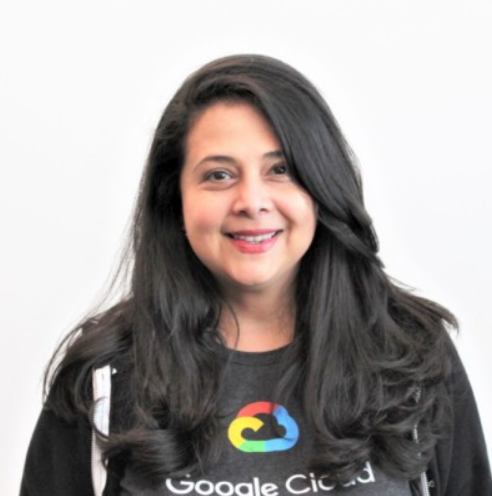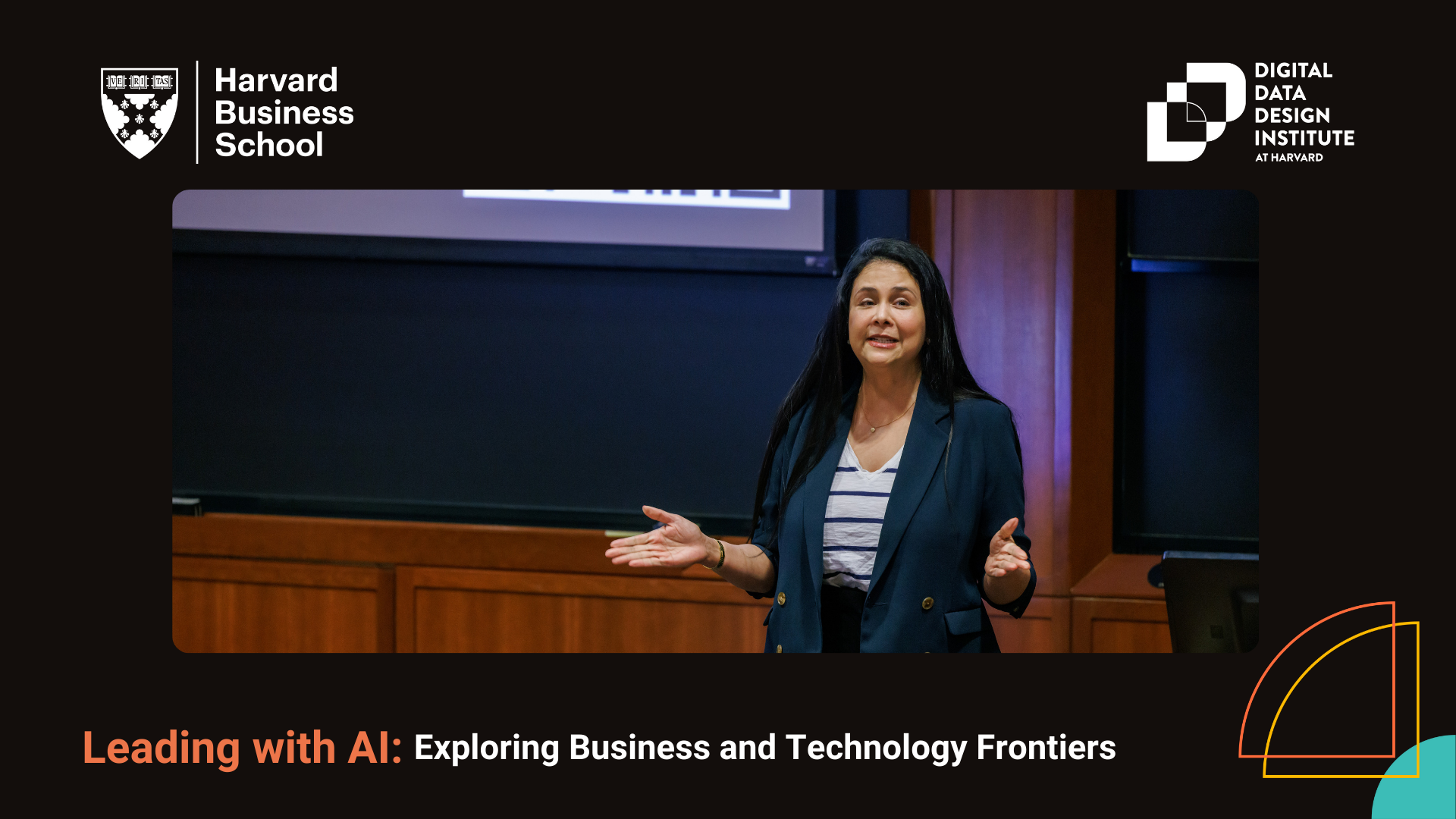On May 7, the Digital Data Design Institute at Harvard hosted Leading with AI: Exploring Business and Technology Frontiers. The conference featured breakout sessions where industry experts discussed specific and specialized topics. The breakout session on “Build with AI and Introduction to Open Source” featured two presenters, Aditi Joshi, AI (Core ML) and Startups/VC at Google, and Lukas Karlsson, Consultant and Google Developer Expert. They presented and demonstrated AI concepts and Google open source AI tools that can enable almost anyone to use AI in practical and powerful ways.
Key Insight: A New Mindset for Product Development
“You don’t need a large team to be able to come up with a unicorn idea, a billion-dollar company. That’s absolutely feasible today or you could do it with a small team like three to five people.”
Aditi Joshi
Aditi told participants not to be intimidated by what they’re hearing about AI, describing it as “just a sophisticated autocomplete.” She outlined the rapid advancement of AI tools and how it has changed the product development process. Without PhDs or computer scientists, she described how individuals or small teams can come up with a minimum viable product (MVP) and develop it through product market fit in a matter of 10 to 12 weeks. In addition, she mentioned the Google for Startups Cloud Program, which provides up to $350,000 in Google Cloud credits to help AI startups.
Aditi also emphasized that product development concepts outlined in Eric Ries’s The Lean Startup and Michael Porter’s five competitive forces are still relevant and intact; however, AI has changed the speed at which the tasks can be accomplished.
Key Insight: Ethical Considerations
“When you’re putting those safety guidelines in place—the privacy, the security in place—you’re going to suffer in terms of accuracy, but in my mind that’s okay because slowly over time the model will learn and it’ll get better.”
Aditi Joshi
Aditi described AI product development as uncertain and probabilistic, which requires technical program management (TPM) skills to ensure the results demonstrate accuracy and quality. Technical program managers help to mitigate risk by considering ethical issues as part of the product development process.
Enterprises should put safety and privacy practices in place and ensure checks and balances exist, and can use U.S. National Institute of Standards and Technology (NIST) guidelines and frameworks for help. Because safety and privacy guardrails might affect data accuracy, thoughtful prompt engineering, fine-tuning, and collaboration with human reviewers are necessary to verify the quality and accuracy of data output.
Key Insight: Fine-Tuning, Prompt Engineering, and the Human Element
“[AI is] doing 60 to 80% of the job for you, which is still better than nothing, which is better than where we were five years ago…it’s not an A or an A+ paper, it’s like a B or a B+…if you don’t know a whole lot about [the topic], you do need to have those experts go in and fine-tune it for you…”
Aditi Joshi
After ensuring ethical guardrails, the next part of the product development process is managing the data:
- Prompt engineering is vital for input, to get the best data out of AI.
- Fine-tuning the output is crucial to identifying inaccuracies.
Aditi used the example of doctors consulting on creating prompts for an AI medical model and validating the results to ensure accuracy and quality of the output.
Aditi ended her part of the presentation by reviewing the concept of multimodality, which enables AI to work across text, images, video, audio, and code. There are many Google and other models available, so businesses must determine the best model for them by defining the problem they’re solving, identifying existing pain points, building solutions, and then iterating to sharpen the product’s value proposition.
Key Insight: Multimodality and Google Gemini
“[I]nstead of starting from a blank sheet, which is kind of the hardest part for me, with a lot of projects I can get something going right away…instead of me sitting there for 20 minutes with the little blinking cursor…now I have something I can work with right away. So that’s kind of powerful.”
Lukas Karlsson
Aditi introduced then Lukas Karlsson, who discussed and demonstrated Google tools, primarily Gemini, and the wide variety of tasks they can accomplish. Lukas summarized these tools by emphasizing the value of practicing and gaining experience with multiple models to begin learning which tools are the best fit for the company and problems it’s attempting to solve.
Key Insight: Practical Applications and Demonstrations
“[AI] understands the context of what you’re saying and the meaning, so it’ll find ten different ways of saying the same thing, different from the way you said it. But the meaning is essentially the same and that I think makes it much easier to mine through that data.”
Lukas Karlsson
Throughout their presentations, Aditi and Lukas presented examples and demonstrations of real-world, practical applications for Google’s open source AI tools. Although processing time will vary, for most of these tasks, AI took just minutes to produce answers or working drafts.
Aditi showed the speed and power of AI as she:
- Converted 10 years and 100 pages of teacher’s notes to a slide deck, an outline, and high-level talking points from those notes
- Compiled the content of many tutorials and PDFs from all attendees at a recent DevLab event in a summary document
- Demonstrated AI analyzing a Buster Keaton film and finding text on a piece of paper and a scene from the film that matched a hand-drawn sketch, including the time codes where these items appear
- Showed a 5-minute video that demonstrated Google Cloud Vertex AI Agent Builder, which enterprises can use to build conversational customer, employee, knowledge, and/or voice agents using natural language prompts
Lukas described how he used various features of Google Gemini, Gemma, and Gems to:
- Build an outline for his presentation at the session
- Plan a family trip to Las Vegas and the Grand Canyon
- Build a project plan and project schedule
- Plan a full-day team event
- Write a consultant contract
- Write emails and social media posts with different levels of detail and length
- Analyze bills and expenses
- Develop Python code and perform code editing
Meet the Speakers

Aditi Joshi, AI Program Lead for Google Cloud AI/Core ML, Google for Startup Cloud Program, is an expert, mentor, affiliate, and member of a wide variety of academic, health care, and high-tech organizations. She obtained her MBA from Stanford University Graduate School of Business and her BS in Psychology and Computer Science from Yale University.

Lukas Karlsson is a Google Developer Expert (Cloud), consultant, advocate, and public speaker, among many other roles. He holds a bachelor’s degree in Computer Science and Philosophy from Oberlin College.
Additional Resources
Aditi Joshi:
- LinkedIn: ajoshi7
- X: @Aditi_V_Joshi
- Fundamentals of AI Product Management (video)
- MIT Hacking Medicine: Building for Digital Health 2021 (video)
- Black Hat 2024 (LinkedIn post)
Lukas Karlsson:
- LinkedIn: lukaskarlsson
- X: @lukwam
- RIP Google Domains & Cloud Domains (updated) (Medium article)
